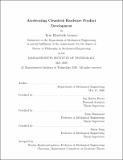| dc.contributor.advisor | Ian Marius Peters, Tonio Buonassisi and Maria Yang. | en_US |
| dc.contributor.author | Looney, Erin Elizabeth. | en_US |
| dc.contributor.other | Massachusetts Institute of Technology. Department of Mechanical Engineering. | en_US |
| dc.date.accessioned | 2020-09-03T17:44:40Z | |
| dc.date.available | 2020-09-03T17:44:40Z | |
| dc.date.copyright | 2020 | en_US |
| dc.date.issued | 2020 | en_US |
| dc.identifier.uri | https://hdl.handle.net/1721.1/127056 | |
| dc.description | Thesis: Ph. D., Massachusetts Institute of Technology, Department of Mechanical Engineering, May, 2020 | en_US |
| dc.description | Cataloged from the official PDF of thesis. | en_US |
| dc.description | Includes bibliographical references (pages 228-241). | en_US |
| dc.description.abstract | Startups in the Cleantech sector have historically had poor return on investment and high failure rates when compared with the medical or software sectors. One reason given for the disappointing outcomes of many Cleantech companies is slow product development (PD) and cycles of learning. In this thesis, I explore the major bottlenecks in hardware product development (PD) including slow cycles of learning, especially in Cleantech. I then develop technical and operational interventions to help overcome these obstacles. I accomplish this through 55 interviews with hardware startup chief executive and chief technology officers worldwide and subsequent analysis of the data from these conversations. By analyzing this data, I find ways to accelerate the innovation process and work toward applying these to Cleantech hardware product development. First, I find that prototyping is the largest time sink for hardware startups with a median of 2.5 years. | en_US |
| dc.description.abstract | I further find that prototyping times are not correlated with certain product complexity metrics. This suggests that something other than technological constraints determines prototyping times. To examine this further, I investigate the impact of innovation models on prototyping times. I find that a flexible, natural innovation model can accelerate early-stage innovation while a structured PD approach is preferred for later-stage innovation. Then through qualitative coding of the interview transcripts, I find another PD bottleneck in relationships with the key stakeholders of investors, customers, and manufacturers. I find several best practices regarding these relationships, and I propose that codifying some of these as requirements in the traditional sense might be a promising strategy to accelerate PD timelines. Next, I present an outlook for technological acceleration strategies that are cutting edge and have only just begun to be used by startups. | en_US |
| dc.description.abstract | These include computational tools like automation, machine learning (ML), and high performance computing (HPC), as well as physical tools like 3D printing. Lastly, I present a computational tool for testing solar photovoltaics as an example of a PD acceleration method. This tool, called Representative Identification of Spectra and the Environment (RISE) uses K-means, a machine learning clustering algorithm. The RISE method overcomes the shortcomings of past spectral classifiers used in industry and academia. This method is technology agnostic and the two parameters of RISE, K₁ and K₂ can uniquely classify all spectra worldwide unlike the commonly used APE classifier. I further demonstrate the RISE method in practice using LED-based solar simulators to test solar devices, capturing more performance data relevant to real world conditions per unit time than current standard testing allows. | en_US |
| dc.description.abstract | Using only 18 representative spectra, I correctly reproduce energy yield differences between silicon solar cells and CdTe solar cells with an accuracy of less then 1.5 ± 0.5% as compared to over 5% when using STC. With the findings enumerated above, this thesis adds data-driven technical and operational strategies to the Cleantech community's playbook to accelerate cycles of learning. | en_US |
| dc.description.statementofresponsibility | by Erin Elizabeth Looney. | en_US |
| dc.format.extent | 241 pages | en_US |
| dc.language.iso | eng | en_US |
| dc.publisher | Massachusetts Institute of Technology | en_US |
| dc.rights | MIT theses may be protected by copyright. Please reuse MIT thesis content according to the MIT Libraries Permissions Policy, which is available through the URL provided. | en_US |
| dc.rights.uri | http://dspace.mit.edu/handle/1721.1/7582 | en_US |
| dc.subject | Mechanical Engineering. | en_US |
| dc.title | Accelerating cleantech hardware product development | en_US |
| dc.type | Thesis | en_US |
| dc.description.degree | Ph. D. | en_US |
| dc.contributor.department | Massachusetts Institute of Technology. Department of Mechanical Engineering | en_US |
| dc.identifier.oclc | 1191716446 | en_US |
| dc.description.collection | Ph.D. Massachusetts Institute of Technology, Department of Mechanical Engineering | en_US |
| dspace.imported | 2020-09-03T17:44:40Z | en_US |
| mit.thesis.degree | Doctoral | en_US |
| mit.thesis.department | MechE | en_US |
